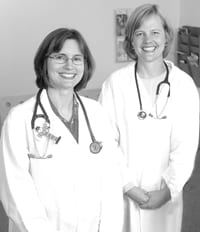Beyond Heartburn – Often, Symptoms Can Indicate Greater Gastrointestinal Problems
Q. Like many people, I suffer from heartburn occasionally and always keep a bottle of antacids handy. Recently, I asked my daughter what to get her husband for his birthday. She kiddingly answered: “A huge bottle of TUMS.” Evidently, he can’t keep enough of them in their medicine cabinet. Is that normal for someone his age – he’s 30?
A. This is not normal. However, it is an all-too-common complaint that we often see in our clinics. TUMS are one of the many types of antacids that people use to suppress heartburn – a symptom that can exist for a number of reasons. Simple causes of heartburn include overeating or eating too much acidic/spicy food. If these symptoms persist, or stop responding to medication — it is time to see your primary care physician, who may refer you to a gastroenterologist.
Q. A friend told me that my son-in-law might have GERD, what is that?
A. GERD stands for gastroesophageal reflux disease. It is a chronic disease where contents from the stomach, which is rich in acid, flow back into the esophagus, leading to inflammation and injury. Normally, a muscle at the bottom of the esophagus, called the lower esophageal sphincter, opens and closes to allow food to pass from the esophagus into the stomach. Similarly, it prevents food and the acidic contents of the stomach from passing back into the esophagus.
This constant regurgitation could place your son-in-law at risk of aspiration (the sucking in of food particles or fluids into the lungs) or choking. Certain triggers cause this muscle to relax more than it should, and acidic stomach contents splash into the esophagus, causing injury. While GERD is the diagnosis, heartburn and regurgitation are the symptoms patients commonly experience.
Q. I’ve heard before that repeated heartburn can result in cancer. Is that true? If so, over what period of time can it turn into cancer?
A. The short answer is yes, it can result in cancer, but this is an area of debate among gastroenterologists. We believed longstanding heartburn to cause chronic injury to the lower esophagus, resulting in Barrett’s esophagus (a condition in which tissue that is similar to the lining of your intestine replaces the tissue lining your esophagus). This condition was thought to have placed all GERD patients at an increased risk of developing a rare cancer called adenocarcinoma of the esophagus.
We now know that there are actually several factors that increase a patient’s risk of developing Barrett’s esophagus and esophageal cancer: being male, white, older than 50 years of age, family history of Barrett’s esophagus, increased duration of reflux symptoms, smoking, and obesity. It is these patients for whom screening endoscopies are most recommended.
The good news is that the chance of developing Barrett’s esophagus in your lifetime is small — less than 10{06cf2b9696b159f874511d23dbc893eb1ac83014175ed30550cfff22781411e5}. And, of those who do develop Barrett’s, only a small fraction of these patients may go on to develop esophageal cancer. The estimated annual transition rate to cancer ranges between 0.12{06cf2b9696b159f874511d23dbc893eb1ac83014175ed30550cfff22781411e5} and 0.5{06cf2b9696b159f874511d23dbc893eb1ac83014175ed30550cfff22781411e5}.
Q. What could be causing so much heartburn for my son-in-law? Why do most people like myself get it occasionally?
A. The most common causes of heartburn include food intake (how much you eat and when), food type (spicy or acidic), medications (such as ibuprofen), smoking, and obesity. In general, if you remove the stimulus, such as spicy foods or overeating, then the symptoms will usually resolve themselves. Medications may be needed for a short period of time to help treat symptoms. But, GERD that persists despite medical treatment needs further evaluation by your physician.
Q. What is the best way to treat heartburn?
A. First and foremost, you or your son-in-law will need to make some dietary and lifestyle changes. Avoid acidic foods such as tomato-based products or spicy food. Do not eat large meals at least two to three hours before you lay down. Lose weight if you are overweight. Stop taking ibuprofen or other irritating medications such as iron, bisphosphonates, and some antibiotics. And avoid tobacco.
This can be coupled with medical therapy, including antacids (TUMS), H2RA (Prevacid), or PPI (Prilosec, Nexium). It is important to take PPIs at least 30-60 minutes before your meal, so that they are most effective. If you find none of these measures work, you will need to see a gastroenterologist for further evaluation.
Q. Is surgery ever needed?
A. Surgery may be needed if symptoms cannot be controlled with diet, lifestyle changes, and medication. Surgeries commonly only offer temporary relief of symptoms; patients often re-experience symptoms several years later and require medical treatment once again.
Q. When should someone see a doctor?
A. When someone has tried basic dietary and lifestyle changes, and/or medications are ineffective — that is when you should arrange a visit to a gastroenterologist. Additionally, if you are having difficulty with swallowing, blood in the stool, family history of cancer, weight loss, low blood counts, or chest pain – you should not wait and see your physician immediately.
Q. Is there any way to be sure you’re just having heartburn and not a heart attack?
A. This is a challenging diagnosis, even for a physician. Severe heartburn that persists can mimic a heart attack, since the heart and esophagus are located close to one another in the chest. If a good burp relieves your symptoms and they don’t return, then it’s most likely a good case of heartburn. But, if you are having difficulty breathing, break out in a cold sweat, are nauseous or lightheaded, and have pain radiating to one or both arms, neck, jaw or back, it could mean you are having a heart attack, and you should seek immediate medical attention. v
Dr. John Wysocki is a gastroenterologist at Baystate Medical Center. Doctors at Baystate Gastroenterology diagnose and treat patients with disorders of the digestive tract including gastroesophageal reflux disease, swallowing disorders, peptic ulcer disease, inflammatory bowel disease, disorders of the liver, gallbladder, and pancreas, and diseases of the colon, to include various types of colitis, diverticulosis, and irritable bowel syndrome. They also diagnose and treat GI tract infections, gastrointestinal bleeding, and gastrointestinal cancers to include esophageal, gastric, pancreatic, liver, small bowel, and colon cancer; (413) 794-7364.



